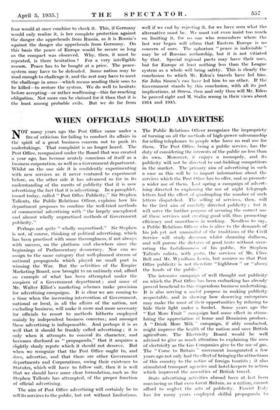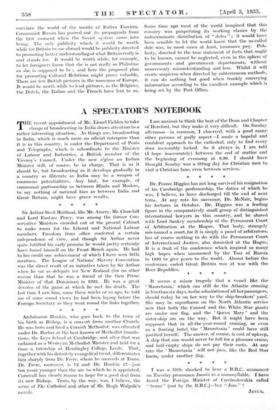WHEN OFFICIALS SHOULD ADVERTISE
NOT many years ago the Post Office came under a fire of criticism for failing to conduct its affairs in t he spirit of a great business concern out to push its undertakings. That complaint is no longer heard. The Post Office, reorganized under the Board that was created a year ago, has become acutely conscious of itself as a business corporation, as well as a Government department. Whilst on the one side it is confidently experimenting with new services as it never ventured to experiment before, on the other side it has advanced so far in its understanding of the merits of publicity that it is now advertising the fact. that it is advertising. In a pamphlet, issued today, called "Post Office Publicity," Sir Stephen Tallents, the Public Relations Officer, explains how his department proposes to combine the well-tried methods of commercial advertising with "the largely unexplored and almost wholly unpractised methods of Government publicity."
Perhaps not. quite " wholly unpractised." Sir Stephen is not, of course, thinking of political advertising, which has been practised with some thoroughness, if not always with success, on the platform and elsewhere since the beginnings of Parliamentary democracy. Nor can we assign to the same category that well-planned stream of national propaganda which played no small part in winning the War. But the activities of the Empire Marketing Board, now brought to an untimely end, afford an example of what has been attempted under the auspices of a Government department ; and some of Mr. Walter Elliot's marketing schemes make provision for advertising campaigns. It is clear we are coming to a time when the increasing intervention of Government, national or local, in all the affairs of the nation, not excluding business, will make it more and more necessary for officials to resort to methods hitherto employed mainly by independent business concerns ; and amongst these advertising is indispensable. And perhaps it is as well that it should be frankly called advertising ; it is only when, it attempts to conceal its character, and becomes disclosed as "propaganda," that it acquires a slightly shady repute which it should not deserve. But when we recognize that the Post Office ought to, and does, advertise, and that there are other Government departments and Corporations, owing their existence to Statutes, which will have to follow suit, then it is well that we should have some clear formulation, such as Sir Stephen Tallents has attempted, of the proper function of official advertising.
The aim of Post Office advertising will certainly be to sell its services to the public, but not without limitations. The Public Relations Officer recognizes the impropriety of turning on all the methods of high-power salesmanship for selling telephones to people who have no real use for them. The Post Office, being a public service, has the duty of considering the interests of the public no less than its own. Moreover, it enjoys a monopoly, and its publicity will not be directed to out-bidding competitors in the market. The primary aim of advertising in such a case as this will be to impart information about the services which the Post Office has to offer, and so promote a wider use of them. Last spring a campaign of advert- ising directed to explaining the use of night telegraph letters had the effect of quadrupling the number of such letters dispatched. The selling of services, then, will be the first aim of carefully directed publicity ; but it will serve the further purpose of securing the correct use of these services and creating good will, thus promoting efficiency and smoothness in working. Needless to say, a Public Relations Officer who is alive to the demands of his job yet not unmindful of the traditions of the Civil Service will study decorum whilst shunning dullness, and will pursue the dictates of good taste without over- rating the fastidiousness of his public. Sir Stephen Tallents enlists, with gusto, the services of Mr. Clive Bell and Mr. Wyndham Lewis, but assures us that Post Office publicity is not therefore "highbrow" or "above the heads of the public."
The intensive campaign of well thought out publicity on which the Post Office has been embarking has already proved beneficial to this stupendous business undertaking. It is also serving a useful purpose in making publicity respectable, and in showing how deserving enterprises may make the most of their opportunities by refusing to hide their light under a bushel. Some years ago the " Eat More Fruit" campaign had some effect in stimu- lating the appreciation of home and Dominion produce. A "Drink More Milk" campaign, if ably conducted, might improve the health of the nation and save British agriculture. The Electricity Board would be well advised to give as much attention to explaining the uses of electricity as the Gas Companies give to the use of gas. The "Come to Britain" movement inaugurated a few years ago not only had the effect of bringing the attractions of this country to the notice of foreign tourists ; it also stimulated transport agencies and hotel-keepers to action which improved the amenities of British travel.
State advertising activities abroad have at last been convincing us that even Great Britain, as a nation, cannot afford to neglect the arts of publicity. Fascist Italv has for many years employed skilful propaganda to convince the world of the merits of Italian Fascism. Communist Russia has poured .ont its propaganda from the first moment when the Soviet system came into being. The only publicity which it would be worth while for Britain to use abroad would be publicity directed to promoting better understanding of what Britain really is and stands for. It would be worth while, for example, to let foreigners know that she is not really so Philistine as she is supposed to be ; and here the proposed plan for promoting Cultural Relations might prove valuable,. There are few British pictures in the museums of Europe. It would be worth while to lend pictures, as the Belgians, the Dutch, the Italian and the French have lent to us. Sonic time ago most of the world imagined that this country._ was pauperizing, its working classes by the indiscriminate distribution of " doles " ; it would have been sensible to let the world know that the so-called dole was, in most cases at least, insurance pay. , Pub- licity, directed to the true statement of facts that ought to be known, cannot be neglected, even in the sphere of governments and government departments, without unnecessary misunderstanding and loss. Whilst it will create suspicion when directed by subterranean methods, it can do nothing but good when frankly conveying information according to the excellent example which is being set by the Post Office.











































 Previous page
Previous page